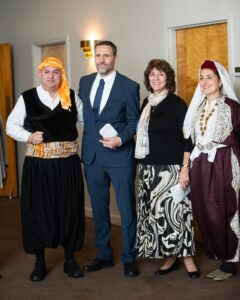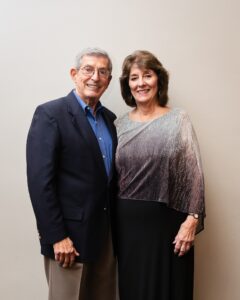2023 marks the 25th anniversary of the Boston Lykeion Ellinidon! As we prepare for our 25th anniversary celebration, we asked BLE founder and president Irene Savas to share her story. Learn more about the event here. We hope you’ll join us on December 3rd!
I have been a dancer all my life. This began with my mother instilling in me the love of classical ballet. Hand in hand, she ushered me to twelve years of ballet classes. I furthered this with classes in modern dance and choreography in college, a stint in Middle Eastern dance, and at various times, amateur classes in ice dancing, disco and ballroom dance. For the latter, my father was my mentor. As a child, I gleefully jumped in as his partner as he would break into an impromptu prance around the house.
Introduced into the Greek dance world, I observed him equally adept at taking the lead in the dance line, so smooth, nimble and spry. Meanwhile, my mother was the one who always reminded me that in all dance forms, Greek dance being no exception, there is grace. And this she naturally personified. I began to become familiar with Greek dance music and steps, albeit the most popular rhythms, played at dance occasions of the day: kalamatianos, tsamikos, sta dio, hasaposerviko, tsifteteli, zeimbekikos. Attending Greek dances as an adult, I was looked upon as a “good dancer” and was encouraged and thoroughly enjoyed taking the lead position. Looking back, I reflect on how naïve I was, thinking that there was only this handful of Greek dances and that I had “mastered” them all!

One day in 1985, a Greek dance troupe performed at a parish event at St. Spyridon Cathedral in Worcester, MA. They were the Hellenic Dancers of New Jersey. Watching them, so many thoughts went through my mind: my education in Greek dance was born. I was stunned by the beauty of a troupe of dancers attired in the regional dress of various areas of Greece. I was astounded at the display of so many dances, all “Greek” but all different, derived from many mainland regions and islands. Opening my eyes to the wealth of Greek dances that make up our heritage, I was blown over as I realized how much insight there was to be gained and how much could be learned by studying our cultural traditions through dance. Not only the basics, it was evident that we could learn history, geography, sociology, religious studies, and cultural anthropology, among other topics, through regional attire, occupations, traditions, and customs. A truly full educational experience!
At that time in my life, I was involved in various youth-related activities, such as Boy Scouts, serving on a board at the high school as a parent representative, and teaching a teenage Sunday school class. A light bulb went off in my head. I realized that young people enjoy nothing more than music and dancing, which help them to loosen, exert and diffuse that excess energy they have stored inside. Here was a way to instill in our youth the understanding and love of our heritage!
The love of dance and personal expression through dance are ingrained in my soul. I see it as timeless and global, and for me, a type of language of its own. Similarities of movements expressing the human spirit are found in all cultures and all genres of dance. What I observe is that Greeks have retained that innate desire to express their personal feelings through dance. Through variations of this expression, from one generation to the next, our cultural traditions are revealed.
In 1986, I founded the V.E.V.A. Hellenic Dance Ensemble. It was made up of teenagers from Worcester’s Greek community. As years progressed, the group became a non-profit organization. Eventually, through my teaching at various other locales, dancers from other communities joined the group: from Andover, Marlboro, Newburyport, and Dover, NH, to name a few. The group performed at many church-related functions throughout New England and attended dance conferences across the U.S. and Canada, where we all learned from notable Greek dance instructors and had the opportunity to perform with other groups from around the country. I became involved in the hosting and chairing of several of these conferences.

In 1998, this activity culminated in our own group hosting a dance conference here in Boston. Two representatives of the Lykeion ton Ellinidon of Greece attended as our instructors. At that event, they bestowed on me a great honor. In recognition of my work in teaching and cultivating Greek dance, I was presented with the seal and the proclamation designating our group as a chapter of that venerable institution, and we became the Λυκειον των Ελληνιδων, Γραφείο Βοστώνης, more commonly known as the Boston Lykeion Ellinidon.
Years of teaching followed and still ensue, now with an adult dance troupe. I taught a series of classes at the Greek Institute, taught an evening class for many years in Watertown, and was a guest instructor for various events, such as the NEFFA festival. A second-generation Greek American, what began as a sojourn into my heritage became a study and, further, a campaign. As a “professional volunteer”, I have since dedicated myself to honoring the commitment of not only our adult dance troupe, but of our organization to promote and actively participate in the preservation of Greek traditional culture.
The Boston Lykeion Ellinidon prides itself on researching elements of our culture and presenting them authentically. I and the Boston Lykeion Ellinidon aspire to perpetuate our glorious Hellenic culture for future generations. This for me is an ongoing vocation, challenge, and vision.